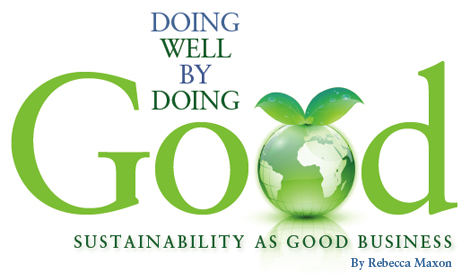

What do Arnold Schwarzenegger, Al Gore, Bill Gates, Bono, Wal-Mart and the Sierra Club all have in common? The answer is that in one way or another all are champions of “sustainability” as an increasingly critical issue for business and for the world. But just what is sustainability?

“Sustainability is, in its simplest terms, about how to do well now without destroying the ability to do well in the future,” says Gerard Farias, executive director of Fairleigh Dickinson University’s Institute for Sustainable Enterprise/Center for Human Resource Management Studies and associate professor of management in Silberman College. “It’s about taking a well-rounded approach to making personal, governmental and business decisions that put environmental awareness and social responsibility on par with sound economics.”
Countless books and articles have appeared on various aspects of societal and corporate sustainability, and special issues have been devoted to the topic by such widely respected publications as The Economist, Business Week, Fortune and Fast Company.
“It has become hard to ignore the possibility that we are doing irreversible harm to our natural environment that threatens to extinguish many important species; shift where and how well we live, get our water and grow our food; and disrupt the critical resource supply chains of many industries,” says Farias. “Wasteful use of energy from fossil fuels not only degrades our environment but worsens our dependence on sources of energy from the most unstable areas of the world.”
But environmentalism is just one aspect of sustainable business practices. Leading firms are seeing that an integrated “triple bottom line” — people, planet, profit — that balances attention to employees, society and the environment with financial outcomes is critical not only to the world’s sustainability, but also to their own long-term viability in the global marketplace.
| “Workforce engagement in sustainability efforts may be the domain of human resources that best epitomizes the ‘people’ part of the triple bottom line.” — Jeana Wirtenberg, Institute for Sustainable Enterprise |
|---|
THE PEOPLE FACTOR
The first factor, people, refers to such issues as providing living wages, ensuring the health and safety of employees in the workplace, attracting and retaining diverse talent and providing support for employees.
Human resources personnel, for example, can contribute to a company’s sustainability profile through leadership development, ethics training and diversity and multiculturalism in hiring practices. High-potential employees may be given extensive professional development opportunities while being introduced to sustainability as an overarching corporate goal. Managers in all areas can be briefed and given training on what their roles in sustainability are, how to introduce their employees to the connection between what they do on the job and sustainability and why it is important.
According to Jeana Wirtenberg, director, external relations and services at the Institute for Sustainable Enterprise, “Workforce engagement in sustainability efforts may be the domain of human resources that best epitomizes the ‘people’ part of the triple bottom line. Not only is employee engagement strongly related to the sustainability of the company, but it is an enabler of customer satisfaction and business growth.”

THE PLANET FACTOR
The planet factor of the triple bottom line is the environmental aspect or the impact the corporation is having on the physical world around it. As a June 2006 Economist article states, “The criticism that climate change has no more place in corporate boardrooms than do discussions of other partisan political issues is surely wrong.”
“The traditional paradigm tells us that corporations operate within a framework set by government, particularly the governments of the United States and other democratic nations,” says FDU Professor of Management Joel Harmon, ISE’s director of research. “Yet, all around us are examples of the largest of these democratic nations taking exception to the case for sustainable practices.”
With legislators sometimes slow to act, private businesses are stepping up to the plate. Ray Anderson, the sustainability pioneer who heads Interface, Inc., a carpeting and floor-covering manufacturer, maintains that it is only through the power of business that the world can make significant progress toward sustainability. He said, “Only business has the power, influence, reach and resources to help the world become more sustainable.”
Interface focuses on harnessing solar, wind, biomass and other forms of green energy and on harvesting and recycling carpet and other petrochemical products — all while eliminating waste and harmful emissions from its operations.
| “It is not only investors. Customers, too, appear to prefer to buy products from companies that are seen to be ethical and responsible.” — AMA Report |
|---|
THE PROFIT FACTOR
The last element of the triple bottom line is what most people usually think of as the bottom line: profit. Such considerations include marketing/production in developing countries, workforce productivity, enhancing innovation and maintaining a positive image with shareholders and the public.
“It is not only investors. Customers, too, appear to prefer to buy products from companies that are seen to be ethical and responsible,” according to a report by the American Management Association (AMA), Creating a Sustainable Future: A Global Study of Current Trends and Possibilities, 2007–2017, the authors of which include Wirtenberg and Harmon, along with key contributors Kent Fairfield, an FDU assistant professor of management, and William Russell, a research associate at ISE.
Opening Page | Profitability | Barriers
Collegiate Commitments
FDU Magazine Home | Table of Contents | FDU Home | Alumni Home | Comments
Images this page (excluding globe) ©iStockPhoto.com/Julien Grondin, Ettore Marzocchi, Kutay Tanir and OC Photo.
©Copyright 2008 Fairleigh Dickinson University. All rights reserved.
For a print copy of FDU Magazine, featuring this and other stories, contact Rebecca Maxon, editor, 201-692-7024 or maxon@fdu.edu.